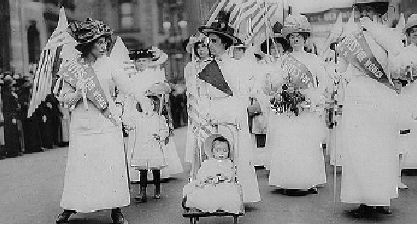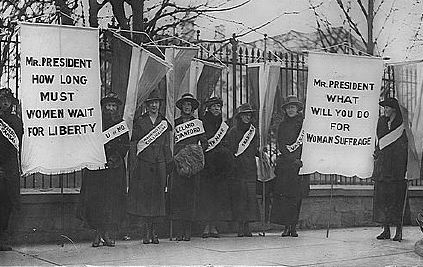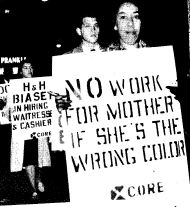
Equal Opportunities
Getting A Chance
To Succeed
I am proud of my
mother because she has a very unusual job. She is a construction
worker. Right now she is working at John F. Kennedy Airport in New
York City. She is building a new conveyor belt at passenger terminal
number four. Some day you or I may pick up our luggage off of the
belt my mother is building.
My mother is a brave person
because she kept trying to get this job. She wanted to be a construction
worker ever since she was a girl my age . I am 10 years old now.
Most women would not try to get a construction job. They may be afraid
that men would tell them no. Men may think that a woman can't do
the same job as a man. They may think a woman is not strong enough
or smart enough to do it.
In the old days women couldn't
get any job they wanted to have. People thought that women should
stay home and cook and clean. But many women did not feel that
way. They wanted to have chances to live like they want to
live. They said this is a free country and women should be
treated equally. They wanted to stop gender inequality.

This cartoon was drawn in 1909.
It shows a woman who wants to go out to vote on election day. She
wants to leave her babies with her husband so he can watch them.
He looks like he doesn't know what to do.
I was surprised when I found
out that women didn't always have the right to vote. I thought that
ever since George Washington was elected president everyone in America
could vote. But when I started to study about this I learned that
women could not vote in this country until 1920. A woman who is 80
years old or older was alive then. One woman in my church
is 100 years old. She was one of the first women who could
vote when she turned 21. I will be able to vote when I am 18 because
the law was changed again.

These women were marching at a demonstration in 1912 to get the right to vote.

In 1917 there was a picket line
of women carrying signs in front of the White House in Washington. They
were asking for liberty. Now we call it women's liberation or women's
lib. Women want to have the freedom to do whatever they want to do
and be treated equally. Women's suffrage means having the right to
vote. They wanted the president and congress to pass laws to help
them.
Women were allowed to vote in 1920
but they were still not satisfied because they could not get the good jobs
they wanted. They did not just want to have to stay home and ask
their husbands for spending money.
Martin Luther King Jr. helped to change
a lot of unfair laws. In those days black people could not go to the same
school as white people. They could not live in a white neighborhood.
They were not given the chance to get the good jobs that white people
had. They got jobs like sweeping or mopping the floor. They could
be an assistant in a store or a factory, but they almost never got to be
the boss. Women, both white and black, had more serious
problems. No matter how smart they were or how hard they worked, they could
not get the same jobs as men. A lot of women started to protest like
the woman in the picture who is carrying the picket sign in 1960.

People who agreed with Martin Luther King Jr. helped to get the Civil Rights Act of 1964 passed. This is what the new law said.
"It shall be an unlawful employment practice for an employer to refuse to hire any individual because of race, color, religion, sex, or national origin."
The new law meant that anyone could
try to get any kind of job they wanted. The boss could not tell them
no because they were black, or they were a woman, or they came from
another country. If the boss was prejudiced against them, they could
go to court and sue the boss.
Things were better then but there
were still problems. Women like my mother could not get a job if
they did not have the skill or training to do the work. If the boss
said you don't know how to do this job so I will not hire you, you could
not prove that the boss was prejudiced against you. It was unfair
because women were not being given the chance to learn to do the work the
men did. So another law had to be passed. This is what the
Equal Opportunity Act of 1972 said.
"It shall be unlawful for any employer to discriminate against any individual because of race, color, religion, sex, or national origin in admission to, or employment in, any program established to provide apprenticeship or other training."
My mother got a job as an apprentice.
An apprentice is a person who is paid to watch how someone else does the
job and to help as an assistant. When they practice enough to be
able to do the job right by themselves, they will get a promotion and more
pay.
I learned a lot about my mother when
I did this project. I found out that it was not easy for her to prove that
she could work as well as a man.
I also found a special poem that I
really like. It is by Nikki Giovanni. She is a black woman
like my mother and she knows what she went through. The poem shows
that even though her life wasn't so easy she got the last laugh. And I
was really excited to see my name, Amanda, in the poem!
Yolande the Panda
Yolande the panda
sat with Amanda
eating a bar-be-cue rib
They drank a beer
and gave a big cheer
"Hooray! for women's lib"
References
Books
A Pictorial History of the Negro in America
Langston Hughes, Milton Meltzer
1963, Crown Publishers, New York
Vacation Time: Poems for Children
Nikki Giovanni
1980, William Morrow, New York
Linked Web Sites
Legal Information
Institute At Cornell University
U.S. Equal Employment
Opportunity Commission
By Amanda
Grade 5
Mr. Gary Greenberg, Teacher
Public School 241
976 President Street Brooklyn, NY 11225